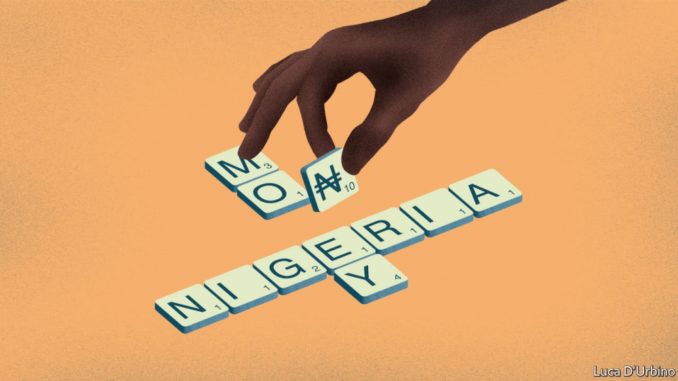
IN THE hot, golden light of an Abuja afternoon two men spin a rotating Scrabble board, oblivious to the flies buzzing around them. The opening moves in the word-building game are relatively low-scoring: “writer” for 26 points, followed by “pool”, “ow”, “or” and “li”. But the scores soon stack up, including two 50-point bonuses for getting rid of all seven letters for “mediant” (the third note of a diatonic musical scale) and “deracine” (from déraciné, a French noun and adjective for someone who has been uprooted). In less than 20 minutes, the time allowed for a professional game, Eta Karo beats Ben Quickpen by 461 points to 410.
Both men are members of the triumphant Nigerian team that last month won the World English-language Scrabble Players Association championship for the second time running. Four of the team’s eight players made the top ten, out of 118 competitors.
Scrabble found fans in Nigeria in the 1980s. It was made an official sport in the early 1990s. Prince Anthony Ikolo, the coach of the Nigerian national team, reckons there are now around 4,000 players in more than 100 clubs around the country (compared with about 2,000-2,500 members in 152 clubs in America and Canada combined). He wants to ensure that “all nooks and crannies in this country have a Scrabble board.” For now, the game’s best players hail from the better-educated south, particularly Lagos and the oil-producing states.
It helps that some states hire Scrabble players as civil servants. Mr Quickpen gets 70,000 naira ($195) a month from Bayelsa state for coaching younger players. He still finds time to play for four hours every day, six days a week. Godswill Akpabio, a former governor and now senator for the southern state of Akwa-Ibom, puts on a yearly tournament. This year the first prize was worth $10,000. Not for nothing is he known as the “Pillar of Scrabble in Africa”.
Good Nigerian players tend to have an encyclopedic knowledge of short words, which they often deploy instead of longer ones in order to block their opponents and conserve useful letters such as S, E and R. Money seems to be their main motivation. Top players can make more than $4,000 a year, a useful income boost in a country where more than half the population makes less than $1.90 a day. “As a people we believe in profits,” says Mr Ikolo. “If there is no prize money it won’t be competitive.”
END

Be the first to comment